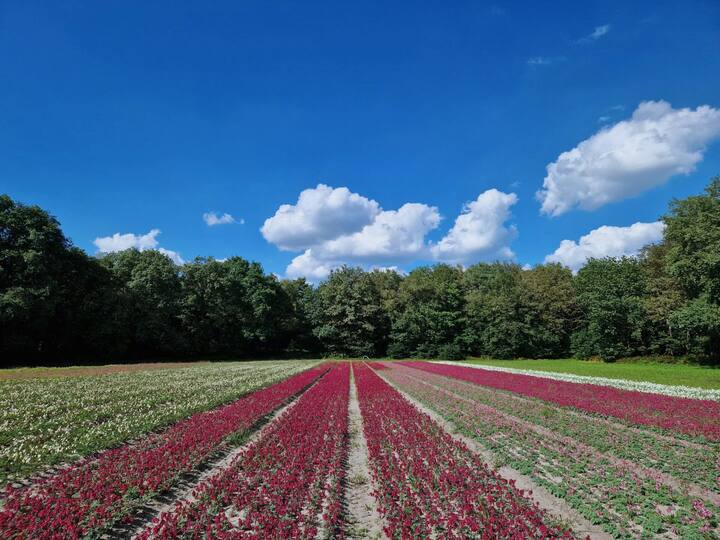
MTS Lucassen about Normec Robalab
“Research into nematodes is more important to us than fire insurance for our house”
Pieter and Marcel Lucassen from Afferden grow more than 10 million perennials in over 800 varieties every year. The brothers invest heavily in the soil quality of their 50 hectares of land. Among other things, they have their plots tested every year for the presence of harmful nematodes. "We see it as risk coverage for crop damage. If we were to skip a year, it could cost us tens of thousands of euros, even up to a hundred thousand!" says Pieter Lucassen of perennial plant nursery MTS Lucassen.
Growth through choices and challenges
Pieter is the third generation in the North Limburg family business MTS Lucassen. His grandparents started a mixed farm in 1920. His parents expanded with pigs, arable farming, and open-field vegetable cultivation. Pieter joined the company in the early 1990s. “Further expansion of the pig farming business was not possible due to nearby nature reserves, and I couldn't make a living from vegetable cultivation,” he says of his decision to start growing dahlias in 1987, and later astilbes. It turned out to be a golden move. The company grew rapidly. Very rapidly.
When his father fell ill and Pieter himself was out of action for a while due to an accident at work, he was forced to think about the future. “I had never looked into things like artificial fertilizers. My father did those things with his fingertips. I don't have that. Legal fertilization standards also meant that I had to come up with something else to be able to continue growing.”
Less fertilizer, better soil life
Pieter came across the Kinsey-Albrecht analysis, a method for measuring the mineral balance in the soil. It opened up a whole new world for him. "When we had the first soil samples taken, it turned out that we needed to use much less fertilizer than we always had. The quality of our soil quickly improved with much less fertilizer. I discovered more and more that we need to grow completely differently. We are destroying our earth with all those chemicals in the soil. Where many people still spray to combat a spot on a plant, we now look at the soil." And with success. Diseases and infestations have almost completely disappeared because MTS Lucassen has banned artificial fertilizers.
‘Never skimp on your nematode testing!
The Limburg plant grower calls himself 'an expert on soil life’. “Nematodes are also part of the soil. Every grower has nematodes in the ground. Not every nematode is bad for plants, but the ones that are cause major crop damage.” He considers it ‘vital’ to know the nematode levels in his soil every year. 'We believe you should never cut back on soil testing. Some growers think the costs are too high. I don't understand how they can think that way. All it takes is one mistake with a corn root knot nematode or root lesion nematode in the soil and you've already recouped your entire investment in nematode testing! It's risk coverage for your business. I think nematode testing is even more important than comprehensive car insurance or home insurance!"
From DNA to microscopic examination
MTS Lucassen has Smeets Agro take soil samples for their nematode research. Smeets Agro sends the samples to Normec Robalab in Deurne. Whereas plant growers used to have the nematodes in their soil identified using DNA technology, they now opt for microscopic identification. "Quality is the keyword for us. Everything is counted several times at Normec Robalab. This is necessary to rule out any harmful nematodes. You can't take any risks. We have much more confidence in this technique than in DNA technology, which is not yet able to detect all nematodes. We now also have more stable figures. With DNA testing, there were always unexplained outliers. But we need to be able to rely on our figures. That's why we stopped using DNA testing."
Soil improvement and plant resilience
Since 2022, MTS Lucassen has been an official demonstration company of the Ministry of Agriculture, Nature, and Food Quality. Pieter and Marcel welcome fellow entrepreneurs, researchers, students, and other interested parties to their farm. “We talk about our approach to soil improvement and work specifically on plant resilience. We also collaborate with HAS Venlo and introduce students to sustainable soil improvement. We hope to inspire future growers with our good results.”
How do you keep the soil healthy?
According to Pieter, every grower should ask themselves the following question: how can I keep my soil healthy and increase the resilience of my plants? He smiles broadly as he answers his own question. "Soil is a living organism. Plants need a combination of natural factors. Plants improve the soil themselves in a symbiosis between healthy bacteria, fungi, and plants. Did you know that how we treat our soil has a direct impact on CO2 emissions and the nutritional value of our food?"
The future
In his plea for annual soil testing and plant resilience, he explicitly looks beyond his own field of expertise. “Healthier crops also mean healthier food. I am convinced that if vegetable growers have their soil analyzed annually and feed their crops exclusively with organic fertilizer, they can improve not only the life of their plants, but also public health.” This is a sustainable goal that the enthusiastic grower would like to commit to himself in the future, with the fourth generation of Lucassens now at his side.
Need help?
Our specialists are happy to assist you with nematode testing. They will help you protect your crops. Read more on our page about nematode testing or contact us.